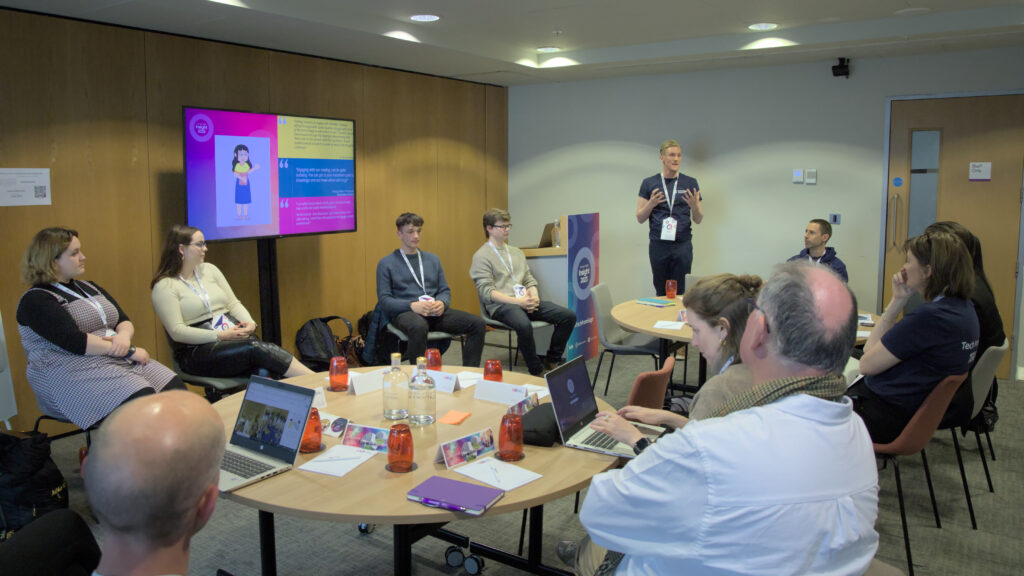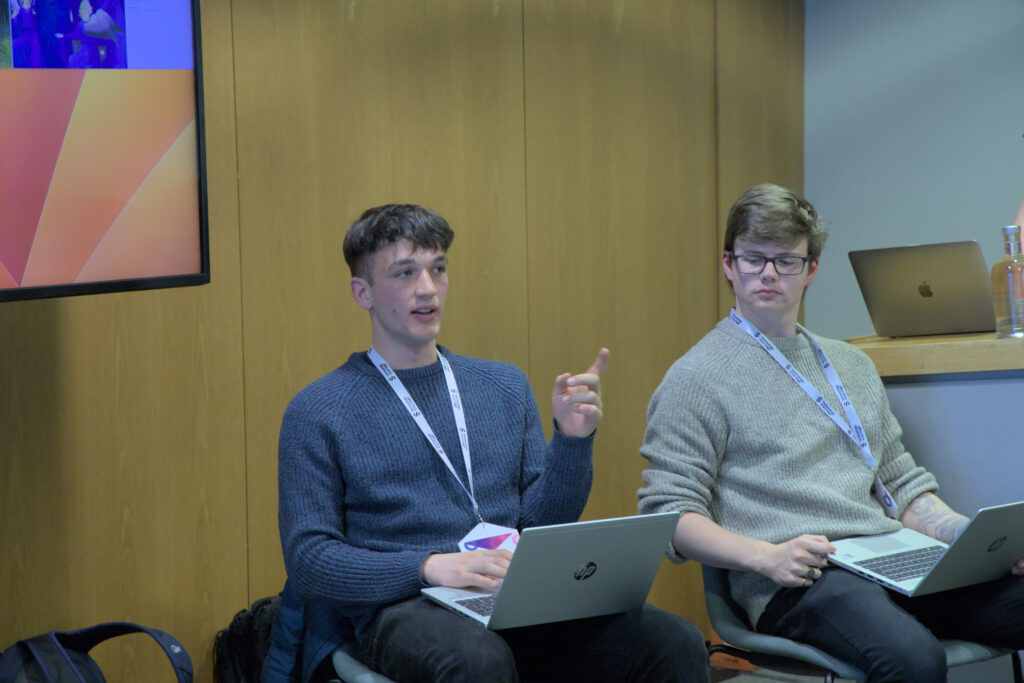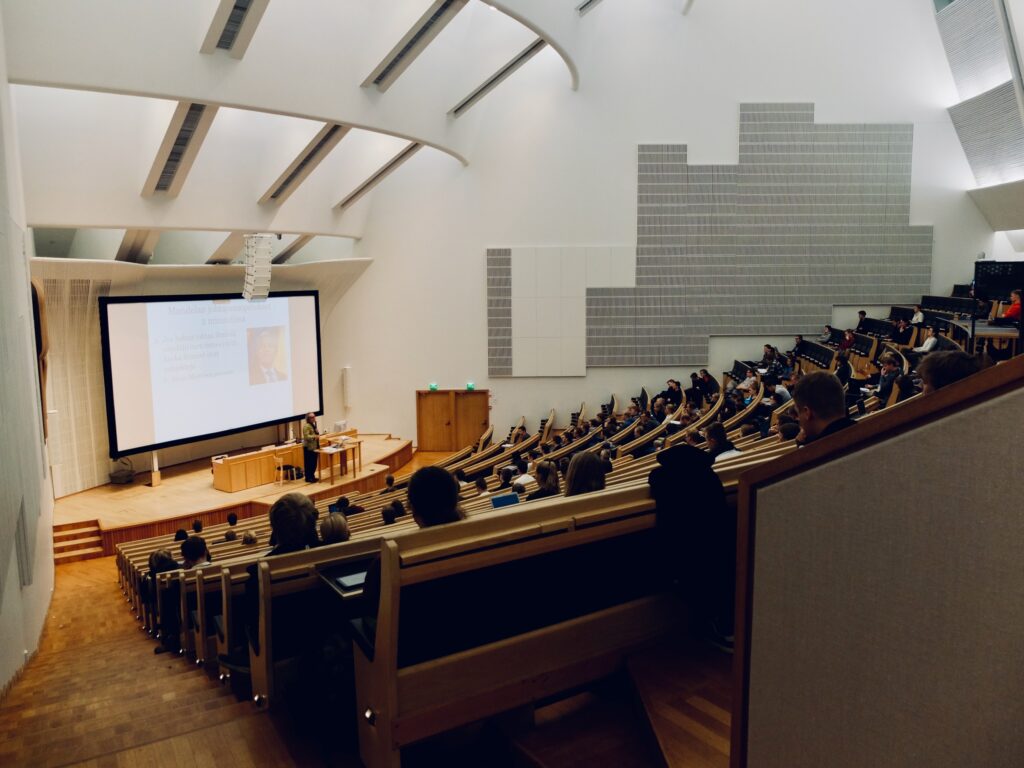
At our inaugural Tech from Sage Insight event in April, we had our breakout session “Ask the Students: Honest insights from students using teaching & learning technologies”. This was an interactive session, with a panel of students discussing their university experience, pedagogy, and the features of different digital tools including: Talis Elevate, Lean Library and Sciwheel.
Check out the recordings from our studio sessions at Tech from Sage insight below.
The panel was facilitated by our Development Manager (International), Christopher Lewis, and the students on the panel were:
In this blog post, we’ll explore the challenges students face in their undergraduate university journey and provide the key takeaways and insights from the students which resonate with their experiences of using digital tools.
University life presents its fair share of challenges, but the integration of digital tools has played a pivotal role in overcoming these hurdles. Students shared their experiences and highlighted how digital tools have addressed common issues faced in their academic journey, including not owning a laptop, or as Stefan says below, being able to ask librarians for support:
“When I think of going into the university library it’s always quite hectic, or at least in the foyer of people coming in and out … Rather than doing that, [wouldn’t it] be good to have somewhere I can go and ask questions about how I can do research?”
Stefan
The integration of digital tools has also had a positive impact on their students’ learning journeys, making learning resources easily accessible and eliminating the need for students to navigate through multiple platforms or physical materials. With everything in one place, students can save time and focus more on their studies. Here are some key points that arose from the session:
Digital tools, like Lean Library, have eliminated paywall barriers, enabling students to access a vast array of scholarly articles and research papers effortlessly. This accessibility has expanded students’ knowledge and enriched their research projects.
I started using it this year. When I started researching my dissertation, and I realized I couldn’t possibly go through 20 different pages of Google Scholar, figuring out if I had access to them. It’s saved me a lot of time.
Sam
We asked the students where they begin their research journey, with many of them beginning their journey with Google rather than the library:
“I tend to just go straight to … the source of a public street to JSTOR, Cambridge, or something like that, rather than navigate the site itself?”
Cameron
Collaborative work has been greatly enhanced through tools like Talis Elevate, giving students the option to participate in discussion anonymously online, giving the silent majority a platform to participate in the conversation. Chris asked the students how they found their experience of using Talis Elevate for their modules:
If you have to look at the content again, for the seminar, you then come with a bit of understanding of where you can be talking about issues you can already see maybe the key themes that are going to be coming up, everyone’s asked along similar lines.
Stefan
Being able to read other people’s comments was like, maybe this means XYZ, it helps me go to the seminar more prepared and get a better understanding of the content.
Sam
Chris asked the students how they felt about referencing regarding their university work:
We have a proprietary referencing system based on MHRA. The university provide us with style guides. Enjoyable is not a word which would apply to referencing in most cases. I personally struggled quite a lot with referencing. It was only in my third year that I discovered reference management softwares, and I used Zotero. I enjoyed it but most reference management software doesn’t adapt to the style guide you’re using.
Annabelle
Annabelle revealed she got signposted to reference management software in her third year of university, in a dissertation skills preparation module, and that it was up to the students to decide which reference management tool to go with and teaching yourself.
After the students played around with Sciwheel, here is what they had to say:
One of the best benefits of Sciwheel is the personalised referencing. Sciwheel responded to customer feedback and got this issue fixed right away. Now that’s resolved, I wish I had a time machine to use Sciwheel for my projects.
Sam
Annabelle and Stefan made the points that they like making references by hand, as they can see where they are in their work, but they can see how reference management tools can be useful for group research projects.
Digital tools have made learning more flexible and convenient. Students can access resources anytime, anywhere, allowing them to tailor their study schedules to their individual needs. This flexibility promotes a better work-life balance and empowers students to take control of their education. We asked students how librarians can encourage student uptake of these tools:
It’s easier to get a different perspective on things via word of mouth. I don’t know if all universities have a network of Student Reps. I’m a Student Rep for my year, so I can signpost students to digital tools or problems in terms of formatting or how to improve library workshops.
Sam

Participating in the workshop and reflecting on how during my studies I was taught using various digital tools reaffirmed to me the importance of intertwining university libraries, teaching, and technology. Universities are continuing to expand, with lecturers’ time further limited and accessing physical resources becoming ever-increasingly difficult. Being able to … use Talis Elevate to unpick say, a 14th century legal document – and see classmates’ comments – accelerated my understanding of topics and made my studying more efficient. Using these sorts of technologies isn’t spoon-feeding students, rather ensuring in the digital age they have possibility to not only learn but learn well.
Stefan
Providing the tools for students to succeed, such as through showing them how to use certain software and digital tools, is conducive to fostering independence within these students, and enhancing their skills development. Students are not experts at studying and researching, and as such, need more guidance to develop these skills.
Sam
The insights shared by students highlight the transformative power of digital tools in higher education. From organisation and accessibility to collaboration and flexibility, these tools have revolutionised the university experience for students. There are still lots of elements to consider for universities and academic libraries, including providing guidance for students on developing these digital skills and encouraging uptake of these tools within the student community.
At Technology from Sage, we are committed to continuously improving our solutions to meet the evolving needs of students. Their honest feedback and experiences are invaluable in shaping the future of teaching and learning tools.
9 Key Findings from Librarian Futures Report Part Two June 22, 2023
Back in 2021, we launched our inaugural Librarians Futures report which investigated areas of misalignment between the support and resources prioritized by libraries compared to the areas most appreciated by patrons through a largescale survey of librarians and their patrons.
To build a more detailed picture of this existing misalignment, we commissioned a student-led research project seeking to better understand student perspectives on the university experience, and more specifically, resource and reading lists for the classroom. This offered us great insight into the existing dissonance between Librarians and students, and was the central part of our second Librarian Futures Report titled The Knowledge Gap Between Librarians and Students.
In this blog post we’ll look at 9 key findings from the Librarian Futures Report Part Two:
When students were asked to identify how they find resources during their course, the most popular answer was “I Google stuff” with 63% of respondents. In contrast, far fewer students answered they either use their library website (35%) or building (27%) while searching for resources, and fewer still use them as their first port-of-call (10%, 6% respectively).
When looking for a reason for this, research has shown that this might be due to students reporting difficulty in using the discovery services provided by their library (Sharman & East, 2022, OpenAthens, 2023).
When students were asked to identify how their library supports their studies, only 34% of students reported that libraries help them find resources and only 24% of students reported that librarians taught them about resources.
This might be due to many students seeing the library as merely a building and a source of collections, with 50% of respondents considering the library’s role in supporting their studies as “providing access to academic resources,” and 46% saying that the library “provides access to textbooks”. Most worryingly, 5% believe the library has no role in supporting their studies.

When asked about their academic reading confidence levels, 32% of non-first-generation students reported they were “very confident” reading academic literature, significantly more than 21% of first-generation students. This trend continues as confidence levels decrease, with 37% of first-generation students identifying as “somewhat confident,” significantly more than 22% of non-first-generation students.
Interestingly, there also is a discrepancy in the confidence levels of student as perceived by students themselves in comparison to academic staff, with 41.8% of students rating their academic reading confidence positively while just 11.6% of staff rating student competency as positive.
When students were asked to identify who had helped them grow in key academic skills, just 25% of students reported that librarians in key areas, including:
The results are affected by the type of students, with more experienced and part-time students being more likely to report that librarians have helped them.
When asked if they have participated in additional academic training, 25% of student surveyed reported that they do not participate in additional training of any sort despite the training given.
The most popular form of training included 34% of students training in study skills, while 32% in writing skills and only 18% taking part in citation management and 12% in information literacy.
With the emergence and extreme popularity of large-language models like ChatGPT, which generate convincing (though often unreliable) text, this challenge is set to become even more crucial.

When students were asked to rate areas where they have most trouble when preparing an assignment, 40% answered that they found it very difficult or somewhat difficult to manage their time, 38% had difficulty keeping focused on a task, and most importantly 31% reported difficulty when trying to receive help when they needed it.
It is worth noting that these pain points shift when students gain more experience, with more prepared students reported that they found it easy significantly more than less prepared.
When it comes to areas where students demonstrated their confidence when writing an assignment and found it very easy or somewhat easy to complete these tasks, 57% chose making notes and annotating sources, 54% chose understanding the assignment, however only a slim majority (52%) reported that they found “finding relevant resources” easy.
When students were asked to identify their approach to learning, 57% of students identified themselves as independent learners.
A reason for this might be a lack of access or knowledge of how to use a collaboration software, with just 10% of respondents identifying a collaboration software as a tool they consider using for planning and preparing for assignments.
When students were asked how long they spent searching for a relevant resource, 25% answered they would spend 30-60 minutes looking for a resource, 12% 60-90 minutes and 17% 90 or more.
This becomes problematic considering that only 25% of students reported receiving help from librarians for accessing resources, and just 16% said librarians had helped them find good information.

The fact that students with disabilities are more likely to spend less time looking for resources highlights the importance of finding them in their workflow and streamlining the access to relevant high-quality information.
Additionally, students without disabilities reported that they are significantly more likely to go to the library building to find resources and are also more likely to see the library as a place to collaborate with other students.
Download our Librarian Futures Part II report to discover more noteworthy insights regarding how academic libraries can be more deeply involved in the undergraduate learning journey.
Share your thoughts about the findings in the new Librarian Futures Part II report on Twitter and LinkedIn.